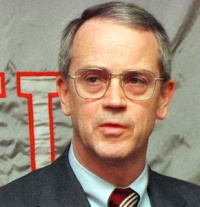32nd Annual MLK Celebration Leadership Award Recipient: Charles M. Vest
Charles M. Vest
MIT President, 1990–2004
32nd Annual MLK Leadership Award

A Champion of Diversity
As the Institute’s leader from 1990 to 2004, he sparked a period of dynamism.
Charles M. Vest was a tireless advocate for research and science, and a passionate supporter of diversity and openness. His deft handling of one of his presidency’s greatest challenges — a public examination of MIT’s troubled history on issues relating to gender equity — ultimately proved a high point of his tenure, reinforcing the Institute’s status as a beacon of meritocracy.
In 1998, Vest forthrightly acknowledged serious gender-equity problems cited by senior women faculty in the School of Science; he then supported corrective measures to address longstanding imbalances. A stunningly candid and publicly released report detailing gender inequity at MIT — and Vest’s subsequent leadership on the issue —stimulated examination of gender equality at universities across the country.
“I have always believed that contemporary gender discrimination within universities is part reality and part perception,” Vest wrote in a much-cited preface to the MIT report on gender equity, “but I now understand that reality is by far the greater part of the balance.”
Vest’s leadership team, and those of MIT’s five schools, reflected Vest’s personal commitment to diversity and inclusion. Under Vest, MIT appointed its first female department head in the School of Science; its first two minority department heads in the School of Engineering; its first five female vice presidents; and the first African-American chancellor.
Throughout his presidency, Vest also strived to bolster the diversity of MIT’s student body and its faculty. Underrepresented minorities grew from 14 percent to 20 percent of the undergraduate population, and from 3 percent to 5 percent of the graduate student body. The number of women grew from 34 percent to 42 percent of undergraduates; when Vest stepped down as president, women outnumbered men in 10 undergraduate majors. The proportion of women graduate students increased from 20 percent to 29 percent during his tenure.
Vest was a staunch advocate of need-based financial aid. In 1992, MIT went to trial to fight the Justice Department’s contention that antitrust statutes were violated when top universities, including MIT, shared information about applicants’ financial need. A lengthy court battle ultimately established the “MIT Standards of Conduct,” enabling colleges committed to need-based aid to exchange certain data, and also led to legislation permitting colleges to adopt a common methodology for measuring need.